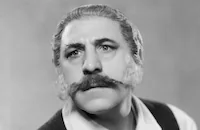Men of America

Brief Synopsis
Cast & Crew
Ralph Ince
William Boyd
Charles "chic" Sale
Dorothy Wilson
Ralph Ince
Henry Armetta
Film Details
Technical Specs

Synopsis
American pioneer Smokey Joe Miller battles Indians on the Comanche Trail and, in 1899, becomes a Pony Express rider and settles in Northern California. In 1932, the now crusty Smokey Joe works in the local post office/general store/gas station with his granddaughter Annabelle, who is in love with Jim Parker, a struggling farmer. After Smokey Joe and Jim engage in a debate concerning the relative dangers of latter-day and modern outlaws, a carload of gangsters pulls up and, at gunpoint, steals gas and cigarettes. Smokey Joe fires his rifle at the fleeing thieves and is nearly killed by their machine guns. The gangsters, who are recent escapees from Leavenworth, then drive to their hidden valley hideout, where Cicero, their leader, upbraids them for their violence. Unable to use the $1,000 bills that they stole during a bank robbery, the gangsters begin raiding the local farms and houses for food and other basic items. When Smokey Joe hears of the thefts, he casts suspicion on Jim, with whom he is angry for kissing Annabelle while she was alone with him in his farmhouse. Jim, meanwhile, loses his kid lambs to the gangsters and reports the theft to their previous owner, grape grower Tony Garboni. As Jim and Tony talk, they are overheard by three of the gangsters, who are hiding in Tony's barn. After Jim leaves, Tony is killed by the gangsters, and his family assumes that Jim is the murderer. In town, a vigilante committee led by Smokey Joe forms to hunt down Jim, who is following the gangsters' trail to the hideout. Alarmed, Annabelle rushes to warn Jim, but on her way back to town, she is ambushed and made a hostage by the gangsters. After Jim convinces the town of his innocence, he organizes a posse and leads them to the hideout, where a fierce shootout ensues. Cicero, the only gangster survivor of the battle, uses Annabelle to escape, but Jim snipes at him from a high rock and, after rescuing Annabelle, finally wins the approval of Smokey Joe.

Director

Ralph Ince
Cast

William Boyd

Charles "chic" Sale

Dorothy Wilson

Ralph Ince

Henry Armetta

Alphonz Ethier
Theresa Maxwell Conover
Eugene Strong
Fatty Layman
Fred Lindstrom
Frank Mills
Inez Palange
Ling
Crew

Film Details
Technical Specs

Articles
Men of America -
By Glenn Erickson

Men of America -
Quotes
Trivia
Notes
Sources conflict concerning the role that Alphonz Ethier played. In most reviews, Ethier is listed in part of "Ole Jensen." A viewing of the film, however, supports the assertion that Ethier played the role of "Indian Tom." According to a Film Daily news item, actor William Boyd "wielded the megaphone" for director Ralph Ince during the scenes in which Ince acted. Charles Gillette is listed in a Film Daily news item as a cast member, but his participation in the final film has not been confirmed.














